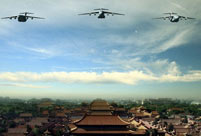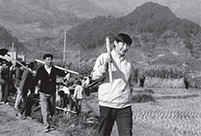 Top 100 beauties in the world!
Top 100 beauties in the world!
 Gallery: Who is the most beautiful one?
Gallery: Who is the most beautiful one?
 If you like autumn, put your hands in the air!
If you like autumn, put your hands in the air!
 Fan Bingbing's "Queen style" in new play
Fan Bingbing's "Queen style" in new play
 Lingerie show at 2014 Miss China
Lingerie show at 2014 Miss China
 J-10 fighters show aerobatic stunts in smog-free sky
J-10 fighters show aerobatic stunts in smog-free sky
 Charming contestants of Shanghai Int’l Model Contest
Charming contestants of Shanghai Int’l Model Contest
 Most amazing chi-pao beauties
Most amazing chi-pao beauties
 7 deadly animal attacks
Russia to launch 70 Proton rockets by 2020: official
7 deadly animal attacks
Russia to launch 70 Proton rockets by 2020: officialBeijing is considering turning a temporary restriction on private vehicles — a system based on odd-even license plate numbers that was used during the APEC meetings — into a long-term policy, drawing praise as well as concerns from the public.
"We have received much positive feedback on the odd-even license plate traffic restriction during the APEC meetings, suggesting that we make it a routine regulation, even on weekends, so we (the municipal government) will further discuss and hold hearings on the suggestion," said Li Shixiang, deputy mayor of Beijing, on Wednesday morning.
But the decision to consider the change does not mean the tough restriction will be implemented soon, Li said.
In contrast to the heavy smog on Wednesday, when the capital issued a yellow alert on air pollution, the third-highest level, Beijing witnessed rare blue skies during the period of the Asia-Pacific Economic Cooperation meetings from Nov 3 to 12, making "APEC blue" a popular phrase.
To control air pollution for the major international event, Beijing implemented strict measures to cut emissions of pollutants by reducing the number of private vehicles on roads based on their license plate number, and by suspending the work of polluting industries and construction sites to control coal consumption.
The restriction on private vehicles worked well, said Zhou Zhengyu, head of the Beijing Commission of Transport, on Nov 10.
The official index indicating the traffic situation showed that traffic flow was reduced during the period by 70 percent instead of the estimated 50 percent, he said.
He said on Wednesday afternoon that he has noticed the heated discussion on the topic, online and otherwise, but he declined to comment on it.
More than 34 million netizens commented on or forwarded the news item about the proposed restriction on the platforms of People's Daily (including weibo and WeChat) since it was released on Wednesday morning.
"I think it's not feasible to rein in the use of private vehicles that harshly, because of the great inconvenience that would be expected," said Wang Wei, a taxi driver in Beijing, adding that if the restriction were to be implemented, the number of taxis should be increased to meet the increased demand.
Several people waiting for buses had mixed opinions. Three of the seven people whom China Daily interviewed at noon on Wednesday said they agreed with the proposed restriction because the reduced vehicle exhaust would bring cleaner air and traffic congestion would be greatly eased.
The four others said they were concerned that a long-term restriction would make the commute more difficult and buses more crowded. Among them, a driver who declined to be named said it wouldn't be fair to make people pay the price, suggesting that the focus should instead be on reducing emissions from industrial production.
Yang Chongyong, deputy governor of Hebei province, said, "Air pollution control needs the joint efforts from Beijing as well as neighboring regions."
To reduce the flow of airborne pollutants from Beijing's neighbors during the APEC meetings, Hebei suspended the work of 8,340 polluting companies and 5,825 construction sites.
The tight rein on air pollution for the past two years hit the province's economy hard, making it experience the most difficult period of development in the past two decades, Yang said, calling for support from Beijing and Tianjin on air pollution control as well as in other ways through integrated regional development.
"The integrated development plan for Beijing, Tianjin and Hebei has finished, and is in the process of review," said Xiao Jincheng, dean of the Institute of Spatial Planning & Regional Economy under the National Development and Reform Commission.
During the integration, cities, especially those in Hebei, should take the initiative to distribute or attract industries based on their functions and make good use of the market instead of working based on administrative orders, he said.
(For the latest China news, please follow @PDChina on Twitter at http://www.twitter.com/PDChina and @PeoplesDaily on Facebook at http://www.facebook.com/PeoplesDaily)
 Female soldiers
Female soldiers Celebrity goddesses
Celebrity goddesses  Official trailer of Y-20
Official trailer of Y-20 Photos: Xi Jinping in Fujian
Photos: Xi Jinping in Fujian Standard faces for each countries
Standard faces for each countries China-made military transport aircraft gets ready
China-made military transport aircraft gets ready World Pole Dance Championship in China
World Pole Dance Championship in China 59-year-old Liu Xiaoqing still looks stunning
59-year-old Liu Xiaoqing still looks stunning  Shocking! Photos of Chinese fighters revealed
Shocking! Photos of Chinese fighters revealed Mainland attitude sealed fate of HK protest
Mainland attitude sealed fate of HK protest Ignorance, psychological concerns surround AIDS phobia
Ignorance, psychological concerns surround AIDS phobia A cure for isolation
A cure for isolation CNPC to sell oil field stakes: report
CNPC to sell oil field stakes: reportDay|Week|Month